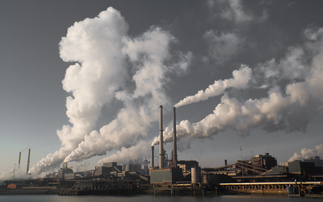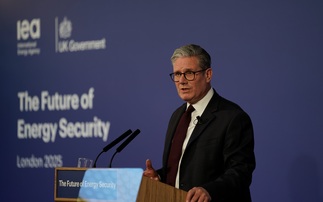Boris Johnson's new Cabinet is greener than it looks, but does it matter?
Is this simultaneously the most right-wing and the greenest Cabinet in modern history? And if the answer is 'yes', as I'd suggest is the case, does it have any hope of delivering on its environmental ambitions when it is preparing to take the biggest economic gamble since the Second World War, remaking the state along more avowedly libertarian lines in the process? Let's just say, the jury is very much out on that one.
As the new Prime Minister would no doubt agree, we should side-line the "doomsters" for a moment and start with the case for optimism. It is easy to trawl through the past comments of the new Cabinet team and find some remarkably regressive quotes on environmental issues, all complemented by some equally sketchy voting records. This context is important and a cause for justifiable concern. After all, do people ever really change?
But there is another, more generous way of weighing new Ministers' commitment to environmental action. Ask yourself this, has there ever been a Cabinet with so many members who recognise the fact we face a "climate emergency" and are comfortable using the language of "climate crisis"? Has there been any suggestion they wish to water down the UK's globally significant, era-shaping net zero emissions goal?
The new Prime Minister may have glossed over the climate crisis in his first two speeches and given Greenpeace's activists a wide berth on his way to the Palace yesterday, but this morning in the Commons he unequivocally declared with characteristic flourish that "our kingdom in 2050 will no longer make any contribution whatsoever to the destruction of our precious planet brought about by carbon emissions. Because we will have led the world in delivering that net zero target."
Michael Gove, the Environment Secretary who just declared that the government's response to the climate crisis had quite simply not been good enough is now installed as de facto Deputy Prime Minister at the Cabinet Office with considerable sway over cross-government co-ordination and priorities. The new Chancellor Sajid Javid distinguished himself during the leadership campaign by repeatedly stressing how tackling the climate crisis should be a top priority, and while he was slightly less outspoken on the topic the new Foreign Secretary Dominic Raab publicly backed the UK's net zero emission target.
Most significantly, the new Business Secretary Andrea Leadsom has gone from infamously asking her officials whether climate change was real when she was first appointed as an Energy Minister under the coalition, to passionately making the case for a climate emergency declaration and the formation of a Cabinet Sub-Committee tasked with delivering the net zero transition - an idea it is hoped will be taken forward at the earliest opportunity.
At Defra Theresa Villiers voting record on environmental issues is decidedly mixed, but she is no climate sceptic and now has Gove's ambitious policy programme to build on. It is also worth noting that the Heathrow expansion-opposing Johnson has put the Heathrow expansion-opposing Villiers in charge of the air quality regulations that remain the most likely avenue for blocking the third runway.
Rounding out the reasons to be, if not exactly cheerful, then at least vaguely optimistic. Claire Perry's appointment as COP26 President is a savvy move, ensuring that an experienced and ambitious political operator with in-depth knowledge of both climate policy and the UN talks has the time to lay the groundwork for a Summit of massive domestic and international importance. As no less an authority than former UN climate chief and Paris Agreement Christiana Figueres tweeted, this is COP26 is "in good hands".
There are signs in this Cabinet of the step change in climate politics that began with the Paris Agreement and has accelerated as the mercury has soared these past two years and public engagement with environmental issues has spiked with it. It remains to be seen if the key figures deliver on their recent rhetoric, but the language of "climate crisis", the UK's legally binding emissions targets, and the intense pressure from the public and the international community will make it near impossible for the Johnson government to row back too vigorously on its stated green ambitions.
That is the good, the problem is the bad and the ugly have arrived in at least equal measure. The "doomsters" have a point.
Transport remains absolutely critical to the UK's decarbonisation agenda, yet new Transport Secretary Grant Shapps' last public engagement with environmental issues was to hawk around the broadcast studios a shadily funded report with links to the Tufton Street group of libertarian think tanks that warned the UK's coal phase out could lead to blackouts over Christmas 2016 and 2017. Needless to say no blackouts materialised. Shapps' could yet sign up to Johnson's desire to secure the UK's position as a world leader in batteries and electric vehicles, but his wider views on climate action remain as inconsistent and confusing as his professional identity used to be.
Shapps' flirtation with ideologically motivated and evidence-light scare stories designed to discredit the decarbonisation agenda is emblematic of the wider threat to the green economy presented by a Cabinet that is stack full of Ministers with long-standing links to the Transatlantic network of 'free-market' think tanks that has done so much to stoke climate scepticism and block environmentally progressive policies. Green-minded Ministers may want to accelerate the UK's climate strategy, but the ideological weighting of the new Cabinet leans heavily towards the kind of gossamer-touch regulation and small state thinking that promises to dilute many of the green policy proposals currently on the table.
The new International Trade Minister Liz Truss is one of the most vocal advocates for this "freedom" loving world view. Given it was only a few months ago she was openly joking about her colleague Michael Gove's desire to give people the freedom to breathe cleaner air and citing environmental rules as an example of the nanny state, it is hard to see her prioritising environmental protection in any post-Brexit trade deals.
And then there is the competence and leadership questions. It is one of the more quietly damning indictments of the past nine years of Conservative-led rule that so few Ministers have emerged with reputations enhanced. Chris Grayling became the poster boy for ministerial incompetence, but he was by no means alone.
How many of Johnson's top team have track records as impressive parliamentary performers with an eye for detail, an ability to work effectively with officials, and a back catalogue of policy successes? Even the Prime Minister himself does not match that description. The fact his Cabinet includes more than one member who was either sacked or resigned in disgrace for completely losing the trust of the previous occupant of Number 10 is a matter of national embarrassment.
There is similarly little evidence the Cabinet boasts much in the way of the leadership nerve required to drive through a programme as complex, wide-ranging, and inherently controversial as the net zero transition. It is extremely easy to imagine even those Ministers who talk of a climate emergency buckling at the first Daily Mail frontpage characterising new policies as a tax on hard-working Britons. As London Mayor, Boris Johnson notoriously rowed back on plans for an expansion in the Congestion Charge zone and rarely picked a fight in support of environmental issues. The new Cabinet may say it wants to deliver a net zero emission economy and will probably deliver some encouraging progress around the clean tech innovation agenda. But is it really willing and able to tackle emissions from boilers or accelerate the phase out of conventional cars and vans or slap a frequent flier tax on aviation? Big tests of political nerve and talent await.
And then there's the ugly, or Brexit to give it its proper name. For the next 98 days at least, and probably a lot longer, the tensions between the Cabinet's green intentions and its ability to deliver effective policies are just a sub-plot to the Brexit drama that will once again consume every last waking minute of Ministers' time and attention.
A constitutional and economic crisis looms and it is extremely hard to see how it can be averted - the only question is how bad will any disruption prove? A 'no deal' crash out, a hugely divisive election, or a further deferral of the critical questions about the shape of any eventual trade deal all remain distinct possibilities.
There is no doubt this looks like a Hard Brexit cabinet tooled up to fight an election blaming Parliamentary Remainers and Brussels intransigence for the failure to deliver the UK's exit from the EU. It is, on balance, a seriously right wing operation that could accommodate an informal electoral pact with Farage's Brexit Party and conceivably secure a parliamentary majority for a 'no deal' Brexit even as a clear majority of the public opposed it. Labour and those who would like to see a social democratic Green New Deal enacted at the earliest opportunity should be terrified. And yet the Opposition's leadership seems too riven by internal divisions to even notice what is happening, much less respond to it in any meaningful way. It is entirely possible that a remain-leaning coalition of the Lib Dems, Greens, and Labour could win more votes than the Tories and still watch on as Johnson claims a mandate for whatever version of Brexit he fancies.
The implications of such a crash out Brexit for the green economy are well documented, ranging from massive economic disruption, huge new trade barriers, and skills shortages, to the distinct possibility of a new deregulatory blitz and years of policy confusion. Johnson could prove to be right in the long term, and the UK may recover from the self-imposed turbulence, but you would be hard pressed to find any business leader outside of a Wetherspoons who wants to take the risk. It is far more likely that the erection of trade barriers with our closest neighbours would see many of the industries, from finance to electric vehicles, that are critical to the development of a modern, net zero economy divert their resources and attention elsewhere. They may never return.
Johnson's 'bring me sunshine' schtick, coupled with a surprising green cabinet and the intense public pressure to act on the climate emergency, provides some reasons for optimism for green businesses. If the government can somehow deliver on Johnson's promises and navigate its way through the Brexit minefield then by mid-autumn you could see the Prime Minister pitching a story of national renewal built around clean technologies, green growth, and the UK's international role as the crucible of the net zero industrial revolution and host of the most important UN summit in human history. Like the man himself, it could prove to be surprisingly popular and politically effective.
But equally, if we know one thing about Johnson it is that he does not keep his promises. As his namesake, President Johnson famously observed the "first rule of politics is learn how to count". The Prime Minister does not have the numbers and he has just torched what was left of relations with a sizeable number of his backbenchers. A Brexit reckoning is coming and it is impossible to predict how it will play out. Meanwhile, alongside those new climate emergency declaring Ministers, Johnson has also empowered a band of libertarian ideologues who are either indifferent or openly hostile to any and all forms of climate action. Buckle up, it is going to be an eventful few months.










